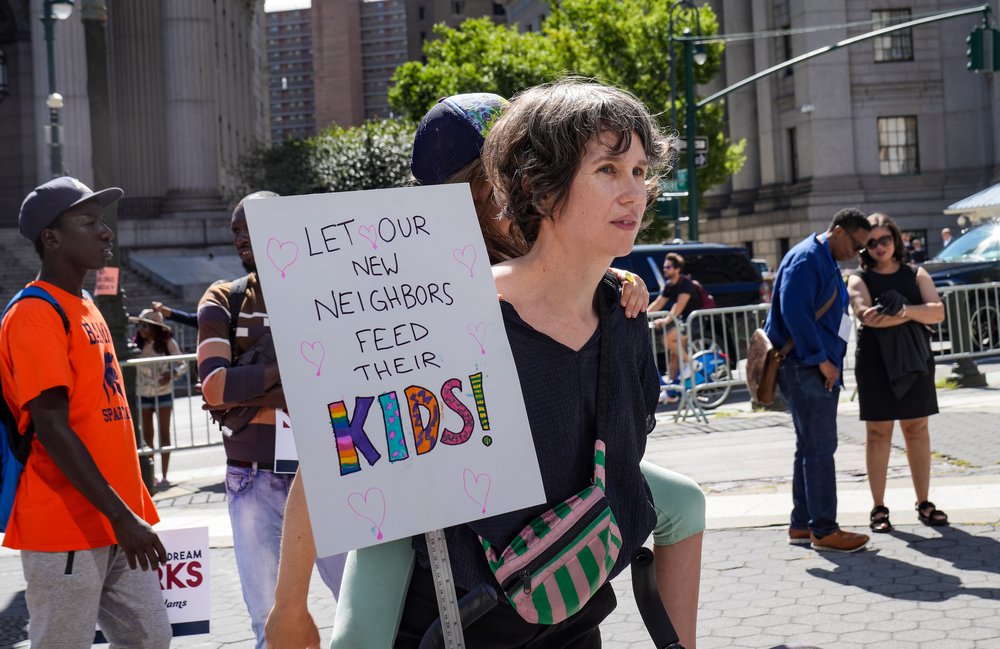New York, looking to boost work opportunities for migrants, relaxes some requirements
Jan. 30, 2024, 4:27 p.m.
The changes backed by the Civil Service Commission and the Hochul administration would affect some 4,000 positions.

New York state government has relaxed the minimum requirements for some entry-level jobs that are hard to recruit for, with the goal of opening thousands of positions to new migrants facing barriers to employment.
The state Civil Service Commission approved the plan, which is backed by the Hochul administration and will potentially make thousands of jobs available to migrants, at a special meeting on Jan. 18. It would partly address migrants' and migrant advocates' persistent complaint that more needs to be done to get new arrivals working.
“As I’ve talked about the migrant crisis…I say we have a dual crisis,” Gov. Kathy Hochul told reporters after an unrelated news conference in Albany, noting that more than 170,000 migrants have entered the state since the spring of 2022.
“It’s a capacity issue,” she added, pointing to the challenges of providing for so many migrants in New York City and other communities. “But also I have a shortage-of-worker crisis.”
The state's unemployment rate was 4.5% in December.
The civil service panel, which controls state agency staffing, created seven “transitional” job titles that would apply to 4,000 hourly positions for food-service workers, office aides, custodians and others, according to a memo from commission leaders. Bloomberg first reported on the initiative.
The new job roles would be temporary, and would not change the requirements for permanent positions. Agencies have identified several potentially restrictive requirements that could be dropped in some cases, such as the need to verify workers’ education level or previous employment, or their ability to speak English, according to the memo.
Must have legal working status
The Hochul administration stressed that the new job titles would be open to everyone with legal working status – including citizens, green card holders and asylum-seekers with working papers. The policy has not yet been implemented, according to Hochul spokesperson Avi Small.
New York private and public employers currently have over 460,000 unfilled jobs, including 10,000 in the state workforce, Small said. Last year, Hochul directed the state Department of Labor to connect migrants with potential employers, and announced in October that her administration had found 18,000 job openings across the state with over 400 employers willing to hire migrants with legal work status.
Mayor Eric Adams applauded the moves and suggested they could be replicated at the city level, including to help reverse the city’s long-standing lifeguard shortage. Roped-off lanes and canceled swim programs were routine last summer as the Parks Department kicked off summer with about a third of the number of lifeguards it said were needed.
“People need to work. Nothing is more anti-American than not having the right to work,” Adams said in a midday press conference.
Adams said the city has explored other options to find legal employment for new migrants.
“What the governor is attempting to do, if it’s accurate, is to find creative ways to do so,” he said, adding: “What can we do to allow people to work, so they’re not sitting around all day, every day?”
The state plan would not apply to the vast majority of new migrants who lack work permits, and face monthslong delays to file asylum applications and receive authorization to work.
In the meantime, many new arrivals have resorted to working off the books as construction day laborers, delivery bike drivers and restaurant staff — positions that many advocates say are ripe for wage theft and worker exploitation.
“The impetus still really is here on the federal government to provide those federal work authorizations as soon as possible,” said Lisa Zornberg, the mayor's chief counsel. “Once a migrant receives federal work authorization, they can be hired by anyone—by any private employer or any public employer. That’s what federal authorization opens the door to.”
'An encouraging sign'
Josh Goldfein, a Legal Aid staff attorney who focuses on asylum-seeker issues, said it was “an encouraging sign” that the governor had ramped up efforts to help new migrants find jobs, and that she sees work-hungry newcomers as an “opportunity” to fix long-standing workforce gaps.
Goldfein has long called on the state to do more to help the city house and care for newly arrived migrants. He said he hopes more such policies are on the horizon.
“People are going to continue to be coming,” Goldfein said. “We can't just stick our heads in the sand and hope this goes away soon.”
Murad Awawdeh, head of the state New York Immigration Coalition, similarly lauded the initiative. He urged the governor and state lawmakers to go “one step further” and pass the Empire State Licensing Act, which would allow immigrants to obtain professional and business licenses, regardless of their citizenship or immigration status.
Ariadna Phillips, a mutual aid organizer who helps migrants apply for jobs, said she’s seen the barriers new migrants face, including difficulty reading job applications and websites in English.
While welcoming the moves, she expressed concern about how migrants would be connected to the new job opportunities.
“Is it going to say something like 'asylum seekers welcome.'?” said Phillips, an organizer with South Bronx Mutual Aid and Colectiva de Ayuda Mutua NYC.
The Civil Service Commission did not immediately respond to a request for comment about outreach efforts to migrants and non-English speaking applicants.
This article was updated with additional comment on the employment changes.
White House will help some NYC migrants get work permits, but offers no sweeping action Federal officials expand efforts to expedite migrant work permits in NYC with new intake center ‘We all came to work’ — NYC migrants react to Biden's relief plan for Venezuelans